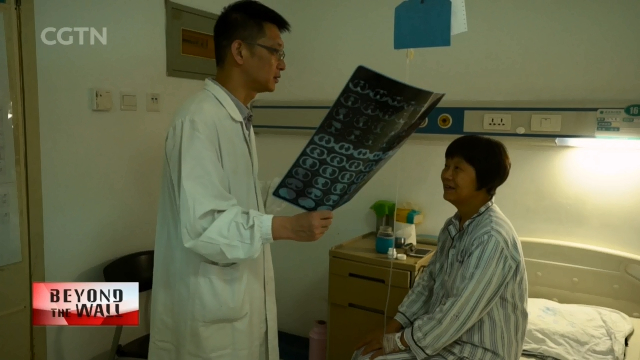
13:47, 17-Sep-2018
Hope for Cancer Patients: China makes biotech breakthroughs in treatment, detection
Updated
13:45, 20-Sep-2018
04:57

China is determined to change from a follower to a leader in biotechnology. Scientists have been focusing on cell therapies and other evolving bio-technologies, such as gene editing and early detection and diagnosis of cancer. In today's special series Beyond the Wall, CGTN correspondent Han Bin meets scientists from a key university for science and technology. Their breakthroughs may bring a fundamental change to global cancer treatment.
Chen Jiayuan is participating in a trial for myeloma, a form of bone marrow cancer. Chimeric antigen receptor cell therapy, or CAR-T, works by hacking the body's biology. Though it's not yet officially approved in China, she believes it's her last chance.
CHEN JIAYUAN MYELOMA PATIENT "I saw some patients being cured and this has given me some hope. It's not a terminal illness. Why can't I try it?"
CAR-T is at the cutting edge of biomedicine. It's an opportunity for China to go the forefront of the industry. Still in its infancy, it's undergoing clinical trials in many Chinese hospitals.
GUO TAO, DIRECTOR UNION HOSPITAL, WUHAN "CAR-T cells are transformed into blood cells that can attack tumours by re-engineering them and re-inserting them to treat tumours."
Doctors believe delayed treatment is a key factor in the low survival rate of cancer patients. Besides therapies like CAR-T, what's urgently needed is a means for early detection.
And scientists at Huazhong University of Science and Technology think they're on the right track.
PROFESSOR XIE QINGGUO HUAZHONG UNIV. OF SCIENCE & TECH. "I regard our full Digital PET as a new generation of Positron Emission Tomography."
PROFESSOR NICOLA D'ASCENZO HUAZHONG UNIV. OF SCIENCE & TECH. "We don't totally prevent, but we can now detect illness five to ten years in advance."
Xie Qingguo's team started research into the All-Digital PET technology in 2001. According to Xie, it can achieve accurate sampling of ultra-high-speed signals, without using analog electronics, something impossible for traditional sampling. International cooperation has accelerated the project's progress.
PROFESSOR XIE QINGGUO HUAZHONG UNIV. OF SCIENCE & TECH. "It saves lives at a much less cost."
PROFESSOR NICOLA D'ASCENZO HUAZHONG UNIV. OF SCIENCE & TECH. "What Digital Positron Tomography is going to the direction of personalized medicine, which is the frontier of medicine and biology. And that's unique."
All-Digital PET has finished numerous tests on mice. Clinical trials on humans are underway in the southern city of Guangzhou. The China Food and Drug Administration is likely to grant approval by the end of this year.
With All-Digital PET technology, China may have a better chance of securing a place in the global high-end medical equipment industry.
PROFESSOR XIE QINGGUO HUAZHONG UNIV. OF SCIENCE & TECH. "I hope one day the Digital PET could be universally available just like other medical equipment, such as CT, MRI or ultrasound."
Xie Qingguo is optimistic about the global market for All-Digital PET. The breakthrough has opened new prospects. Scientists participating in the project say the device is revolutionary. It's one of the leading bio-technologies to come out of China. Ten such machines have been manufactured so far. And one is in Chicago.
HAN BIN UNION HOSPITAL, WUHAN "China aims to become the world's new destination for cancer cell therapies and evolving technologies, such as the PET scan. The push for innovation comes from the government strategy, with the biotech industry receiving special attention. And this gives a new hope in the fight against the number one killer disease in this country."
GUO TAO, DIRECTOR UNION HOSPITAL, WUHAN "More than 60 patients in our hospital have tried CAR-T. We can't say they're cured, but the survival rate is 80 percent."
The survival rate may be too good to believe, but desperate patients feel they have nothing to lose.
CHEN JIAYUAN MYELOMA PATIENT "I've seen other myeloma patients still live for 5 to10 years. I believe my disease can be cured, too."
For Chen Jiayuan, the picture is looking brighter. Technology could be giving her a new lease on life, and new meaning to the philosophy: It can't hurt to try.
Han Bin, CGTN, Wuhan.

SITEMAP
Copyright © 2018 CGTN. Beijing ICP prepared NO.16065310-3
Copyright © 2018 CGTN. Beijing ICP prepared NO.16065310-3